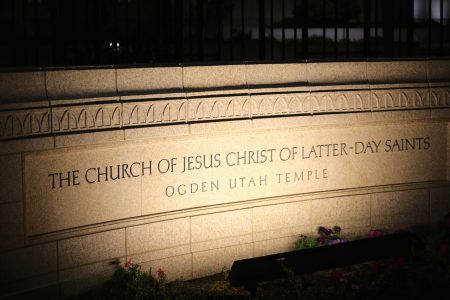Following is the last in a series of columns on The Baptist Faith & Message 2000: Messengers to the 2023 SBC Annual Meeting in New Orleans voted to amend Article VI of The Baptist Faith & Message to clarify the role of pastor. Messengers approved a motion by Jared Cornutt, pastor of North Shelby Baptist Church of Birmingham, Ala., to amend Article VI: The Church to add the words “elder/overseer” alongside “pastor.” The amended portion of Article VI originally read: “In such a … [Read more...]
Article XVIII of the BF&M: The Family
Following is another in a series of columns on The Baptist Faith & Message 2000. Article XVIII of The Baptist Faith & Message 2000 reads: “God has ordained the family as the foundational institution of human society. It is composed of persons related to one another by marriage, blood, or adoption. “Marriage is the uniting of one man and one woman in covenant commitment for a lifetime. It is God’s unique gift to reveal the union between Christ and His church and to provide for the … [Read more...]
Article XVII of BF&M: Religious Liberty
Following is another in a series of columns on The Baptist Faith & Message 2000. Article XVII of The Baptist Faith & Message 2000 reads: “God alone is Lord of the conscience, and He has left it free from the doctrines and commandments of men which are contrary to His Word or not contained in it. Church and state should be separate. The state owes to every church protection and full freedom in the pursuit of its spiritual ends. In providing for such freedom no ecclesiastical group … [Read more...]
Article XVI of the Baptist Faith & Message 2000: Peace and war
Following is another in a series of columns on The Baptist Faith & Message 2000. Article XVI of The Baptist Faith & Message 2000 reads: “It is the duty of Christians to seek peace with all men on principles of righteousness. In accordance with the spirit and teachings of Christ they should do all in their power to put an end to war. “The true remedy for the war spirit is the gospel of our Lord. The supreme need of the world is the acceptance of His teachings in all the affairs … [Read more...]
Article XIV of BF&M: Cooperation
Following is another in a series of columns on The Baptist Faith & Message 2000. Article XIV of The Baptist Faith & Message 2000 reads: “Christ’s people should, as occasion requires, organize such associations and conventions as may best secure cooperation for the great objects of the Kingdom of God. Such organizations have no authority over one another or over the churches. They are voluntary and advisory bodies designed to elicit, combine, and direct the energies of our people … [Read more...]
Article XIII of the BFM: Stewardship
Following is another in a series of columns on The Baptist Faith & Message 2000. Article XIII of The Baptist Faith & Message 2000 reads: “God is the source of all blessings, temporal and spiritual; all that we have and are we owe to Him. Christians have a spiritual debtorship to the whole world, a holy trusteeship in the gospel, and a binding stewardship in their possessions. They are therefore under obligation to serve Him with their time, talents, and material possessions; and … [Read more...]
Article XII of the BFM: Education
Following is another in a series of columns on The Baptist Faith & Message 2000. Article XII of The Baptist Faith & Message 2000 reads: “Christianity is the faith of enlightenment and intelligence. In Jesus Christ abide all the treasures of wisdom and knowledge. All sound learning is, therefore, a part of our Christian heritage. The new birth opens all human faculties and creates a thirst for knowledge. Moreover, the cause of education in the Kingdom of Christ is co-ordinate with … [Read more...]
BFM Article XI: Evangelism, missions
Following is another in a series of columns on The Baptist Faith & Message 2000. Article XI of The Baptist Faith & Message 2000 reads: “It is the duty and privilege of every follower of Christ and of every church of the Lord Jesus Christ to endeavor to make disciples of all nations. The new birth of man’s spirit by God’s Holy Spirit means the birth of love for others. Missionary effort on the part of all rests thus upon a spiritual necessity of the regenerate life, and is … [Read more...]
Article X of the BF&M: Last Things
Following is another in a series of columns on The Baptist Faith & Message 2000. Article X of The Baptist Faith & Message 2000 reads: “God, in His own time and in His own way, will bring the world to its appropriate end. According to His promise, Jesus Christ will return personally and visibly in glory to the earth; the dead will be raised; and Christ will judge all men in righteousness. The unrighteous will be consigned to Hell, the place of everlasting punishment. The righteous … [Read more...]
Article IX of the BF&M: The Kingdom
Following is another in a series of columns on The Baptist Faith & Message 2000. Article IX of The Baptist Faith & Message 2000 reads: “The Kingdom of God includes both His general sovereignty over the universe and His particular kingship over men who willfully acknowledge Him as King. Particularly the Kingdom is the realm of salvation into which men enter by trustful, childlike commitment to Jesus Christ. Christians ought to pray and to labor that the Kingdom may come and God’s … [Read more...]
Article VIII of the BFM: The Lord’s Day
Following is another in a series of columns on the Baptist Faith & Message 2000. Article VIII of the Baptist Faith & Message 2000 reads: “The first day of the week is the Lord’s Day. It is a Christian institution for regular observance. It commemorates the resurrection of Christ from the dead and should include exercises of worship and spiritual devotion, both public and private. Activities on the Lord’s Day should be commensurate with the Christian’s conscience under the Lordship … [Read more...]
Do Christians and Mormons worship the same God?
EDITOR’S NOTE: This article was first published in 2016, but the question has been raised recently by ongoing controversy regarding Mormonism and the popular show, “The Chosen” (Read more here). See another column about Mormonism and biblical Christianity here. Do Christians and Mormons worship the same God? The question may irk our LDS friends, who insist that the Church of Jesus Christ of Latter-day Saints is the restored Church and therefore cannot be distinguished from orthodox … [Read more...]
- « Previous Page
- 1
- 2
- 3
- 4
- …
- 21
- Next Page »











